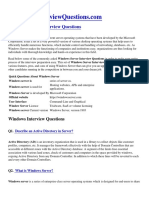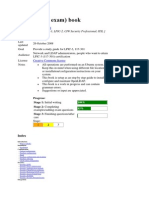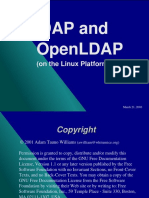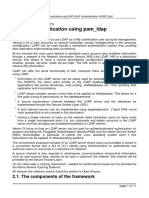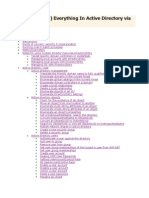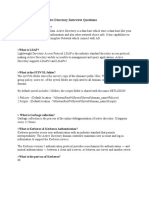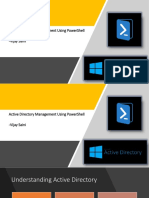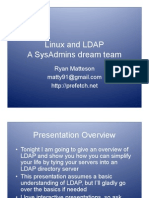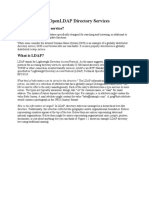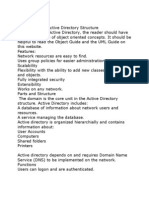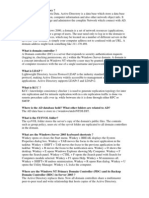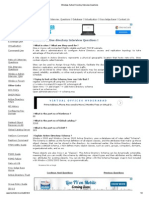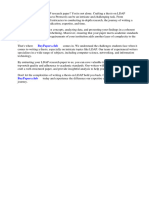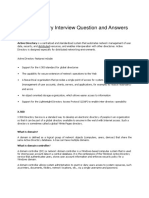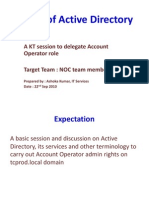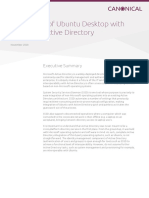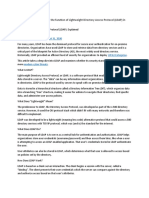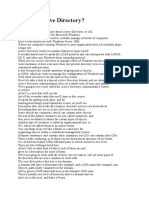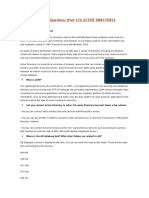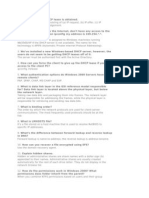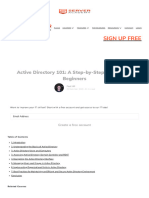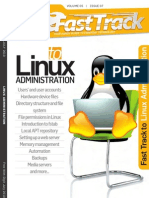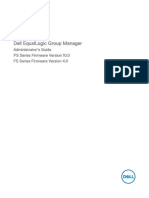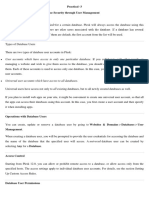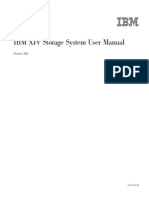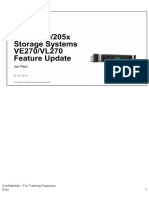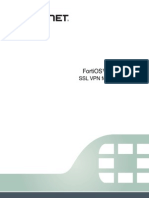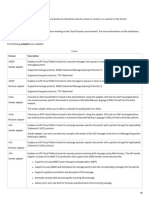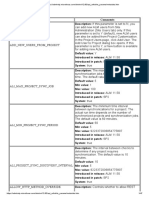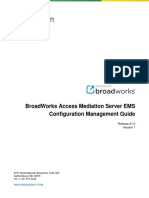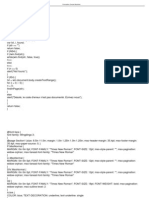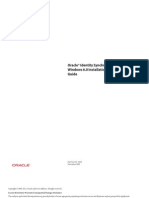Authenticating Against Active Directory: Paul Nijjar
Authenticating Against Active Directory: Paul Nijjar
Uploaded by
Achmad MaulanaCopyright:
Available Formats
Authenticating Against Active Directory: Paul Nijjar
Authenticating Against Active Directory: Paul Nijjar
Uploaded by
Achmad MaulanaOriginal Title
Copyright
Available Formats
Share this document
Did you find this document useful?
Is this content inappropriate?
Copyright:
Available Formats
Authenticating Against Active Directory: Paul Nijjar
Authenticating Against Active Directory: Paul Nijjar
Uploaded by
Achmad MaulanaCopyright:
Available Formats
Authenticating Against Active Directory
Paul Nijjar
Waterloo Wellington IT Professionals Group
June 27 2011
The Issue
Active Directory gives you a store of usernames, passwords and security groups. Maintaining multiple sets of usernames/passwords is a pain. Sometimes companies other than Microsoft create tools that you want to use in your organization. Wouldnt it be nice to authenticate against Active Directory?
The tools: LDAP and Kerberos
Active Directory (AD) is a big Lightweight Directory Access Protocol (LDAP) database/directory. Domain logins are done via Kerberos (but other authentication is not...) Idea: Third party applications can authenticate via LDAP lookups.
Things you need
An understanding of the Active Directory structure for your organization. A minimally privileged user to do LDAP lookups. LDAP support for the application you are authenticating. Blissful ignorance of the security implications involved.
My Environment
Active Directory (forest level Windows 2003) Clients/webapps running on Debian or Ubuntu GNU/Linux
LDAP Structure
Think of AD as a folder structure, with DCs, OUs, CNs as the folders and attributes as the les. You need the path to your users and groups, e.g.
CN=Paul Nijjar,CN=Staff,OU=TWC,DC=theworkingcentre,DC=org
The attribute for username is sAMAccountName Tools: adsiedit.msc , AD Users and Computers, ldp.exe
Lookup User
AD does not allow anonymous LDAP lookups, so I made a user: LDAP Lookups and gave it access (Delegate Control) to read all attributes in AD Users and Computers. The password for this account will often be stored in plaintext, so lock it down: Take the user out of the Domain Users group Restrict the computers the user can log into Keep the user in a distinct OU from your regular users (?) Keep track of the LDAP path for this user, eg
CN=LDAP Lookups,CN=Users,DC=theworkingcentre,DC=org
Examples
Example: Apache .htaccess
This requires the mod_authnz_ldap Apache module.
AuthBasicProvider ldap # DN of Active Directory server AuthLDAPUrl ldap://dc1.theworkingcentre.org/ DC=theworkingcentre,DC=org?sAMAccountName ?sub?(objectClass=*) AuthLDAPBindDN "cn=LDAP Lookups,cn=Users, dc=theworkingcentre,dc=org" AuthLDAPBindPassword XXX
Apache cong, part 2
# Require groups AuthLDAPGroupAttributeIsDN on require ldap-group CN=it-department,OU=Groups, OU=TWC,DC=theworkingcentre,DC=org # Prevent Internal error: pcfg_openfile() # called with NULL filename errors AuthUserFile /dev/null
Example: Request Tracker
Request Tracker is a trouble-ticket system. I needed a third-party module to do LDAP authentication for it.
Request Tracker, part 2
$LdapServer="dc1.theworkingcentre.org"; $LdapUser="cn=LDAP Lookups,cn=Users, dc=theworkingcentre,dc=org"; $LdapPass="XXX"; $LdapBase="ou=Staff,ou=TWC, dc=theworkingcentre,dc=org"; $LdapUidAttr="sAMAccountName";
More RT authentication
# Could filter more here... $LdapFilter="(objectclass=user)"; # map LDAP attributes to RT3 $LdapMap = { Name => $RT::LdapUidAttr, EmailAddress => mail, RealName => cn, };
Other Apps
Cacti graphing system Drupal content management system Mediawiki Anything that has an LDAP plugin should work.
Now, the Bad News
Licencing!
Your domain controllers run on Windows Server (duh) Anything that accesses Windows Server requires a CAL (even DHCP leases!) So LDAP lookups denitely require CALs
Security!
Is central authentication a good idea? By default, LDAP lookups on port 389 are unencrypted! (Including passwords?) Websites without SSL throw around passwords or their hashes in cleartext! Any sloppy implementation jeopardizes the security of Active Directory! More reading: The Godzilla Security Tutorial, Part 3:
http://www.cs.auckland.ac.nz/~pgut001/tutorial/
The End
Bonus: Joining Linux Clients to Domains
There are two general approaches:
1 2
Use winbind from the Samba suite to enumerate every user and password in Active Directory. Store Linux user information in Active Directory directly, using PAM, Kerberos and LDAP.
Both approaches require you to congure both LDAP lookups and Kerberos authentication.
Winbind
The likewise-open package makes the Winbind method easy, but it appears to be incompatible with newer releases of Samba. Manual instructions: https://help.ubuntu.com/community/
ActiveDirectoryWinbindHowto
Advantage: works with AD forest level 2003 without schema modications. Disadvantage: enumerating users for big domains is inefcient.
Direct Method
Instructions: https:
//help.ubuntu.com/community/ActiveDirectoryHowto
Advantage: This is the most similar to Windows client interactions. Disadvantage: You must modify the AD schema for forest level 2003 or lower, using the Services for UNIX package. (Server 2003 R2 and higher include the schema changes natively.)
The End (Really)
You might also like
- Windows Server Interview QuestionsDocument7 pagesWindows Server Interview QuestionsRizwana Rizwana Begam100% (1)
- Active Directory TutorialDocument30 pagesActive Directory TutorialBadrinath KadamNo ratings yet
- LDAP Intergration With AIX, Linux and DB2Document17 pagesLDAP Intergration With AIX, Linux and DB2Krishna SwarnkarNo ratings yet
- LPIC-3 (301 Exam) Book: Rootkit - NLDocument27 pagesLPIC-3 (301 Exam) Book: Rootkit - NLCédric LevenNo ratings yet
- Ldapv3 PDFDocument508 pagesLdapv3 PDFvitryNo ratings yet
- LDAP Pentesting Best PracticesDocument12 pagesLDAP Pentesting Best Practiceskocherla ManoharNo ratings yet
- LDAP Implementation HOWTODocument11 pagesLDAP Implementation HOWTOcodety CODETYNo ratings yet
- SupportDocument33 pagesSupportbank slashNo ratings yet
- Howto: (Almost) Everything in Active Directory Via C#Document18 pagesHowto: (Almost) Everything in Active Directory Via C#Cristhian ChamorroNo ratings yet
- What Is Active Directory ?Document22 pagesWhat Is Active Directory ?Sanjay DaNo ratings yet
- Windows Active Directory (AD) Interview QuestionsDocument4 pagesWindows Active Directory (AD) Interview QuestionsRainu JacobNo ratings yet
- Write About Global Catalog. How To View Replication Properties For AD PropertiesDocument19 pagesWrite About Global Catalog. How To View Replication Properties For AD PropertiesChandan KumarNo ratings yet
- COC 3 ModuleDocument18 pagesCOC 3 ModuleAaron Zerachiel GuiasilonNo ratings yet
- Active Directory FundamentalsDocument6 pagesActive Directory FundamentalsgoodthoughtsNo ratings yet
- What Is Active Directory?Document10 pagesWhat Is Active Directory?Diong SalvadorNo ratings yet
- Windows Active Directory, Backup & VMWare Interview QuestionsDocument6 pagesWindows Active Directory, Backup & VMWare Interview QuestionsManoj ReddyNo ratings yet
- Active Directory Managemnt Using PowerShell Sec01 05Document107 pagesActive Directory Managemnt Using PowerShell Sec01 05ovodf100% (1)
- Linux Ldap AuthenticationDocument21 pagesLinux Ldap Authenticationshekhar785424No ratings yet
- Introduction To OpenLDAP Directory ServicesDocument12 pagesIntroduction To OpenLDAP Directory ServicesrpashamNo ratings yet
- A Useful PowerShell Script To Document Your Active Directory Environment - Petri IT KnowledgebaseDocument7 pagesA Useful PowerShell Script To Document Your Active Directory Environment - Petri IT KnowledgebasechrisNo ratings yet
- TP5.-CentOS OpenLDAPDocument7 pagesTP5.-CentOS OpenLDAPEmma maNo ratings yet
- ACNDocument22 pagesACNAmiable DollNo ratings yet
- Active Directory, DNS, DHCP Q & AnsDocument53 pagesActive Directory, DNS, DHCP Q & AnsSudhir Maherwal100% (4)
- Abbreviations/Acronyms ExpansionDocument7 pagesAbbreviations/Acronyms ExpansionAbhijeet KumarNo ratings yet
- Techiebird: Windows Active Directory Interview Questions !Document2 pagesTechiebird: Windows Active Directory Interview Questions !Satish BabuNo ratings yet
- Ldap Research PaperDocument7 pagesLdap Research Papergw2cy6nx100% (1)
- The Ldap ProtocolDocument24 pagesThe Ldap ProtocolAjitav BasakNo ratings yet
- AD Interview QuestionsDocument16 pagesAD Interview QuestionsMohammed AbdullahNo ratings yet
- Active Directory Interview Question and AnswersDocument15 pagesActive Directory Interview Question and Answerssethii_ankushNo ratings yet
- Basic of AD For NOC TeamDocument29 pagesBasic of AD For NOC TeamNigam MehtaNo ratings yet
- LDAPDocument5 pagesLDAPVineeth NandanamNo ratings yet
- What Is Active Directory ?Document3 pagesWhat Is Active Directory ?Manikandan NatarajNo ratings yet
- Custom Servers Solutions: TechiebirdDocument3 pagesCustom Servers Solutions: Techiebirdxxx proNo ratings yet
- Techiebird: Latest Active Directory Interview QuestionsDocument3 pagesTechiebird: Latest Active Directory Interview QuestionsSatish BabuNo ratings yet
- What Is LDAP?: What Kind of Information Can Be Stored in The Directory? The LDAP Information Model Is BasedDocument10 pagesWhat Is LDAP?: What Kind of Information Can Be Stored in The Directory? The LDAP Information Model Is Basedrsivakumar_1979No ratings yet
- What Does The Active Directory Do?Document17 pagesWhat Does The Active Directory Do?mmmmaran4uNo ratings yet
- Big AdminDocument26 pagesBig AdminSammy Thiong'oNo ratings yet
- Getting Active Directory Up and Running: PC Network AdvisorDocument7 pagesGetting Active Directory Up and Running: PC Network Advisorfantasy242425No ratings yet
- Integration of Ubuntu Desktop With Microsoft Active DirectoryDocument30 pagesIntegration of Ubuntu Desktop With Microsoft Active DirectoryTACTIC CRMNo ratings yet
- HL 1Document6 pagesHL 1behailu getachewNo ratings yet
- Enabling LDAP For IBM FlashSystem A9000Document28 pagesEnabling LDAP For IBM FlashSystem A9000vikrantp1008No ratings yet
- Active DirectoryDocument3 pagesActive Directorysamidhawalvekar99No ratings yet
- Apache Directory ServerDocument11 pagesApache Directory ServerPriyanka GoyalNo ratings yet
- Understanding Active Directory - Level 100 - DocumentDocument54 pagesUnderstanding Active Directory - Level 100 - Documentamlesh80No ratings yet
- Active Directory Diagnostics Troubleshooting and Recovery PDFDocument42 pagesActive Directory Diagnostics Troubleshooting and Recovery PDFVijayabhaskar ChowdaryNo ratings yet
- 1.what Is Active DirectoryDocument3 pages1.what Is Active DirectoryazimNo ratings yet
- Active DIRECTORY Technical Interview QuestionsDocument22 pagesActive DIRECTORY Technical Interview QuestionsShivakumar S KadakalNo ratings yet
- Wintel L1Document14 pagesWintel L1neviljoshiNo ratings yet
- Top 17 Active Directory Interview QuestionsDocument4 pagesTop 17 Active Directory Interview QuestionsBharathNo ratings yet
- Active Directory UsersDocument26 pagesActive Directory UsersvishwahNo ratings yet
- Active Directory 101 - A Step-by-Step Tutorial For Beginners - Server AcademyDocument9 pagesActive Directory 101 - A Step-by-Step Tutorial For Beginners - Server Academyjose felix JoseNo ratings yet
- Join Domain UbuntuDocument19 pagesJoin Domain UbuntuBhushan BhuvanNo ratings yet
- Digit Fast Track To Linux AdministrationDocument113 pagesDigit Fast Track To Linux AdministrationRaghavan Mohan100% (3)
- Active Directory Interview Question and Answers: Home Blog Microsoft Windows Privacy Policy Who We AreDocument2 pagesActive Directory Interview Question and Answers: Home Blog Microsoft Windows Privacy Policy Who We AreArya ManiNo ratings yet
- Active Directory FundamentalsDocument50 pagesActive Directory Fundamentalskelvinkakuru2No ratings yet
- Ldap Documentation 2021.8Document7 pagesLdap Documentation 2021.8Noureldin IdrisNo ratings yet
- Active Directory ThesisDocument5 pagesActive Directory Thesisnicoledixonmobile100% (2)
- Quick Configuration of Openldap and Kerberos in Linux and Authenicating Linux to Active DirectoryFrom EverandQuick Configuration of Openldap and Kerberos in Linux and Authenicating Linux to Active DirectoryNo ratings yet
- Getting Started with CockroachDB: A guide to using a modern, cloud-native, and distributed SQL database for your data-intensive appsFrom EverandGetting Started with CockroachDB: A guide to using a modern, cloud-native, and distributed SQL database for your data-intensive appsNo ratings yet
- Open LdapDocument74 pagesOpen Ldapsollun3No ratings yet
- RHEL 8.5 - Integrating RHEL Systems Directly With Windows Active DirectoryDocument41 pagesRHEL 8.5 - Integrating RHEL Systems Directly With Windows Active DirectoryITTeamNo ratings yet
- OpenText Documentum Server CE 22.2 Release NotesDocument27 pagesOpenText Documentum Server CE 22.2 Release NotesDamo100% (1)
- Check Point Certified Security Expert 156-315.77Document130 pagesCheck Point Certified Security Expert 156-315.77awdNo ratings yet
- 10-6291-EN-R2 PS v10.0 Admin Guide PDFDocument583 pages10-6291-EN-R2 PS v10.0 Admin Guide PDFrogeriomachado_rsNo ratings yet
- Perforce Helix CheatsheetDocument2 pagesPerforce Helix CheatsheetJohn SmithNo ratings yet
- How To Troubleshoot Identity Awareness Issues - CheckpointDocument17 pagesHow To Troubleshoot Identity Awareness Issues - CheckpointZaki JanuarNo ratings yet
- DDBMS PracticalsDocument24 pagesDDBMS PracticalsDoon ValyNo ratings yet
- VCenter Server UpgradeDocument41 pagesVCenter Server UpgradeKIRUBAKARAN100% (1)
- RubyDocument447 pagesRubySareeya ShreNo ratings yet
- Cisco ASA Series General Operations CLI Configuration Guide, 9.2 PDFDocument1,164 pagesCisco ASA Series General Operations CLI Configuration Guide, 9.2 PDFmasterone1810No ratings yet
- CLI XIV CommandsDocument416 pagesCLI XIV CommandsDinesh PunyaniNo ratings yet
- 5.2.1 Inst Win SQL WasDocument238 pages5.2.1 Inst Win SQL WaschoraNo ratings yet
- HPE MSA 1050 205x Storage Systems VE270 VL270 Feature Update Final 13aug2018 PDFDocument40 pagesHPE MSA 1050 205x Storage Systems VE270 VL270 Feature Update Final 13aug2018 PDFNazirul BahaNo ratings yet
- Fortios™ Handbook: SSL VPN For Fortios 5.0Document49 pagesFortios™ Handbook: SSL VPN For Fortios 5.0leninvryNo ratings yet
- Cups Integrate CucmDocument20 pagesCups Integrate CucmSanjeev KumarNo ratings yet
- How To Install and Configure OpenLDAP and PhpLDAPadmin On An Ubuntu 14Document12 pagesHow To Install and Configure OpenLDAP and PhpLDAPadmin On An Ubuntu 14Muhammad NazirNo ratings yet
- Sap Cpi AdaptersDocument8 pagesSap Cpi AdapterscvcllvNo ratings yet
- HPE Single Phase 1GB UPS Network Management Module User Guide-a00044618en_usDocument143 pagesHPE Single Phase 1GB UPS Network Management Module User Guide-a00044618en_usjerem.alexandreNo ratings yet
- Understanding of LDAP in DSS: Jan 2010 by Vineet ChauhanDocument33 pagesUnderstanding of LDAP in DSS: Jan 2010 by Vineet ChauhanVineet ChauhanNo ratings yet
- Was8.5 DumpsDocument33 pagesWas8.5 DumpsSathish PillaiNo ratings yet
- Site ParametersDocument47 pagesSite ParametersAlberto R. Pérez MartínNo ratings yet
- Broadworks Access Mediation Server Ems Configuration Management GuideDocument118 pagesBroadworks Access Mediation Server Ems Configuration Management GuideLazaro BalamNo ratings yet
- OpenText Directory Services 16.0 - Tenant Management Guide English (OTDS160000-CCS-EN-02)Document16 pagesOpenText Directory Services 16.0 - Tenant Management Guide English (OTDS160000-CCS-EN-02)Aymen EL ARBI100% (1)
- The LPIC-2 Exam PrepDocument699 pagesThe LPIC-2 Exam PrepspyderlinuxrgmNo ratings yet
- FortiAnalyzer 6.0 Lab Guide-OnlineDocument85 pagesFortiAnalyzer 6.0 Lab Guide-OnlineКалоян ПетровNo ratings yet
- Domino CommandsDocument3 pagesDomino CommandsAshish Daga100% (3)
- Introduction To Oracle Solaris 11.4 Network Services: Part No: E61002Document20 pagesIntroduction To Oracle Solaris 11.4 Network Services: Part No: E61002Paulo AnjosNo ratings yet
- Oracle Errors FileDocument18 pagesOracle Errors FileSalama NouriNo ratings yet
- Oracle® Identity Synchronization For Windows 6.0 Installation and Configuration GuideDocument254 pagesOracle® Identity Synchronization For Windows 6.0 Installation and Configuration GuideSrinivas ToomuNo ratings yet
